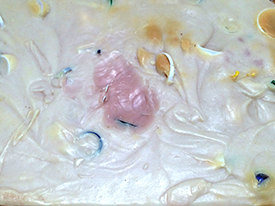 Microbeads are tiny pieces of plastic that are used in bodycare products like toothpaste and face washes to help scrub (and begs the question: why?!). After they do the job that natural alternatives have done for thousands of years, they get washed down the drain. These tiny pieces of plastic are so small, water treatment plants don’t capture them, so they end up in our waterways. Eventually, they make it out to the ocean, where they hang out with the tons of other plastic pollution that doesn’t belong there, and get eaten by fish, birds, turtles and other organisms who mistake plastic for their favorite foods.
Microbeads are tiny pieces of plastic that are used in bodycare products like toothpaste and face washes to help scrub (and begs the question: why?!). After they do the job that natural alternatives have done for thousands of years, they get washed down the drain. These tiny pieces of plastic are so small, water treatment plants don’t capture them, so they end up in our waterways. Eventually, they make it out to the ocean, where they hang out with the tons of other plastic pollution that doesn’t belong there, and get eaten by fish, birds, turtles and other organisms who mistake plastic for their favorite foods.
These terrible impacts of our unnecessary plastic consumption have inspired a lot of creative action. One community member, who spends her days making soap at Artha Soaps, decided to make a giant block of soap filled with plastic litter because she feels, “Plastic garbage belongs in soap as much as it belongs in albatross tummies or the oceans.” She’s loaned us her garbage patch soap for the month. It smells amazing, and has inspired many intrigued visitors to touch it. The big bottle caps and rings poking through remind us of “macrobeads.” Both the art soap and microbeads demand the same question: why is there plastic in this soap?
That question places doubt that the plastic needs to be there. One of the most important ways we can battle plastic in our lives is by exploring the alternatives. What do we gain when we give up plastic? This Sunday, July 26 from 1-3 pm we’ll be hosting a workshop to learn to make your own Skin Cleansing Scrub and Toothpaste, with alternative ingredients to plastic microbeads. We hope you’ll join us, and give our special art soap a visit! Space is limited — register online here.



